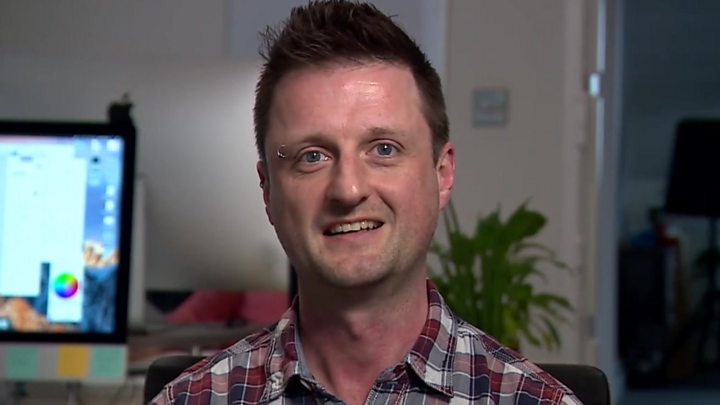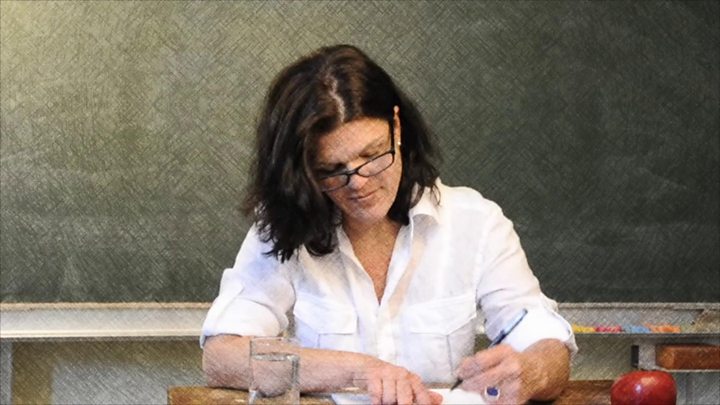 Image copyright Getty Images
Image copyright Getty Images Cash incentives and a better work-life balance are part of a new attempt to solve England’s teacher shortage.
Plans published on Monday by ministers will offer some young secondary teachers £5,000 in their third and fifth years in the classroom – on top of initial £20,000 training bursaries.
Young teachers could also have some protected time for extra training.
Head teachers’ unions said more help for young recruits was essential to tackle the crisis in teacher numbers.
Currently, teachers in subjects with shortages, such as physics, chemistry, and languages, can receive a bursary of up to £26,000, but there are no further payments.
The so-called “early career payment” scheme, which rewards teachers for staying in the classroom, has already been trialled for maths teachers.
Labour has criticised the plan, saying the plan will not reverse “six consecutive years” of missed teacher recruitment targets.
What’s the problem?
By 2025 the number of secondary school pupils in England will have gone up by 15%.
For several years England has had an unfolding teacher crisis, with too few starting to train and too many leaving.
In 2018/19 the number starting training as secondary school teachers was 17% below target.
Subjects such as physics, chemistry and computing face the largest shortfalls.
This has led to a growing proportion of lessons in some secondary schools being taught by teachers who are not specialists.
And there has been growing concern that young teachers are leaving because they feel overworked, burnt out and disillusioned.
Of those that started in 2012, a third were not teaching five years later.

Research has consistently shown workload as a bigger factor than pay, even though teachers have also fallen behind other graduate professions.
Even so the government accepted the advice this year from independent advisers to allow a pay rise of up to 3.5% for many teachers.
A teacher’s minimum starting salary in England is £22,917 rising to £28,660 in inner London according to their pay review body.
Estimates of other graduate starting salaries are about £30,000 to £45,000 in sectors such as banking, which also seek to recruit maths and science graduates.
What is the government doing about it?
The plans published on Monday are firmly aimed at not just recruiting but also keeping more young teachers in their jobs.
For the first couple of years in work they are being promised more support in training, and a reduced timetable of teaching.
That could mean an hour or two a week of protected time, around 5% of the timetable, for teachers in their second year.
Education Secretary Damian Hinds says he also wants to reduce the mounds of paperwork that leave teachers demoralised.
“I think teachers work too many hours – aggravated by unnecessary tasks like excessive marking and data entry, spending more than half their time on non-teaching tasks,” he says.
That will depend on the school inspectorate Ofsted delivering on its recent promise to not ask for so much data to be collected.
Minsters want head teachers to push back against Ofsted if they think demands for paperwork are unreasonable.
Now that more than half of secondary schools are academies, Mr Hinds has little direct control over how they organise workload.
As we reported last year, some schools are already turning their back on excessive marking.

For many young teachers it’s when they start to think about having their own family that work-life balance becomes critical.
Teaching is a largely female profession, but it is notoriously difficult to work part-time as a secondary school teacher.
The education secretary is promising a matching service for teachers looking for job shares.
In practice, a culture change among head teachers may also be required to make it work as they draw up the timetables.
The plan also contains financial incentives to keep young teachers in their jobs.
Hasn’t some of this been tried before?
A lot of taxpayers’ cash has been spent in recent years on bursaries to attract graduates in shortage subjects such as maths, physics, chemistry, and languages.
That added up to £191m in 2016/17 in England.
They’ve been criticised as poor value for money, with some trainees taking the one-off tax-free lump sums of up to £26,000 and still leaving teaching a few years later.
So the government has already been piloting what it calls early career payments for trainee maths teachers.
Under these schemes, there are also payments of £5,000 in the third and fifth year of teaching – on top of a one-off £20,000 bursary at the beginning of training.
This approach will now be tried more widely – but it is not known for which subjects.
Over the coming years a sizeable proportion of the money spent on bursaries to train could be shifted to incentives to keeping teachers in the profession.
Teachers working in more challenging schools might receive more.
But previous attempts to tackle the shortage of teachers in England have faltered.
The government abandoned the idea of a national teaching service which was meant to parachute teachers into schools in deprived areas.
Plans to recruit ex-servicemen and women were also widely described as a flop because so few qualified.
The government has been criticised in the past for failing to get a grip on the problem, or even acknowledge how serious it is for schools.
After the 2015 election, the schools minister Nick Gibb insisted there was no crisis in teacher recruitment, despite the strong anecdotal evidence from head teachers to the contrary.
The newly-announced plan is bigger, and it’s trying to tackle several of the key issues at the same time.
That’s one reason, perhaps, why Geoff Barton, from the secondary head teachers’ union ASCL, says this could be a “game changer”.
Carole Willis, chief executive of the National Foundation for Education Research, welcomed the plan but questioned whether “the pace of implementation proposed is fast enough to deliver what is needed as pupil numbers in secondary schools continue to rise”.
Labour Shadow Education Secretary Angela Rayner said: “Teacher recruitment targets have been missed for six consecutive years and teachers are leaving the profession in record numbers.
“Nothing in this strategy will reverse years of real terms pay cuts and the huge cuts to school budgets that have made it impossible for schools to recruit the staff they need.”
Read more: www.bbc.co.uk




![[Video] How to get rid of bed bugs in Toronto](https://www.thehowtozone.com/wp-content/uploads/2019/10/maxresdefault-2-100x70.jpg)


